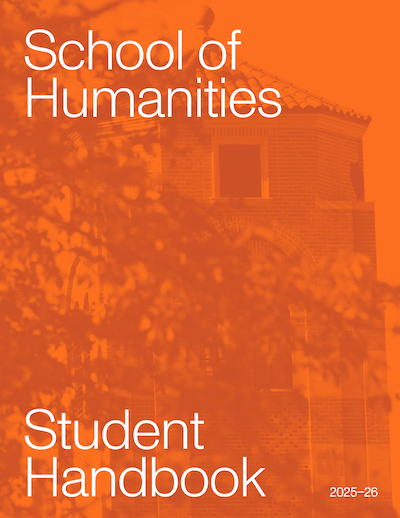Understanding the School of Humanities and Arts Student Handbook

The Humanities and Arts Undergraduate Advising Handbook is designed to help potential and current Humanities and Arts majors and minors, first years to seniors, craft their courses of study. While this handbook cannot trace every possible route through the rich and varied terrain of the humanities and arts, it serves as starting point while encouraging you to broaden your mind, ambitions, and experiences. Enclosed within the handbook are resources that speak to the particulars of all our school’s scholarly and creative offerings, useful contacts and resources, information on humanities research opportunities, internships and practica and other ways to stay in touch with what our school has to offer.
Given this handbook is an evolving document, envisioned as a resource relevant to you, reach out if you have ideas on how to make this resource better. Send your suggestions to humanties@rice.edu.
Read more: Humanities and Arts Student Handbook, 2025-26 >>
The Big Picture
Humanities and Arts coursework trains students to analyze evidence, interrogate presumptions, craft compelling arguments, master creative expression, all while challenging the status quo. These capacities are vital, not only for a wide range of careers, but key to cultivating a lifelong engagement with the world as citizens and leaders and are critical for addressing the challenges and seizing the opportunities that await you no matter what future you seek.
To understand better why the humanities and arts matter, explore pages 3-4.
Our School Makeup
See page 30-131 of the handbook for a full list of all the School of Humanities and Arts Departments, Programs and Centers. From this main page you can navigate to pages that will break down specific requirements for all the majors and minors we have available within our school, including information on course requirements, frank advice, recommended introductory courses, travel and honors opportunities and more.
Navigating Advising and Finding Your Guides
Face to face contact and conversation are a hallmark of our school and key in determining what’s right for you during your time as an undergraduate. Use this handbook to find the faculty who can help you think through a plan of study that best fits all your interests and ambitions. For useful resources on how to navigate humanities advising see pages 5-8, 9-12, and 13-15. Pages 137-38 list the current Humanities and Arts Directors of Undergraduate Study, your main points of contact for all major and/or minor specific advising.
Four-Year Planning
Most Humanities and Arts majors require 10-12 courses in addition to university-wide requirements. HUMA minors require 6 courses. For ways to think through long term course planning see the department, program, and center pages which offer sample four-year plans for all available HUMA majors and minors.
For overarching elements to consider as you think through how to map your humanities and arts course of study see pages 9-12 for additional advice to keep in mind.
Get Connected
To connect with other students dedicated to the humanities and arts, reach out to a Dean of Humanities Undergraduate Advisory Council (DHUAC) member. Established in 2018, the Dean of Humanities and Arts Undergraduate Advisory Council is a group of humanities and arts dedicated students who serve as a consulting body on a wide range of topics, including advising, programming and events for the undergraduate student body, curricular matters and community building. Advisory Council members are excellent guides for undergraduates who are interested in majoring or minoring in a humanities field. You can find a directory of all current members on pages 25-28.
General Bachelor’s Requirements
To view a checklist of key requirements for a bachelor's degree at Rice, see pages 13-15.
Humanities & Arts Research
Given the humanities and arts encompasses a wide variety of disciplines and creative practices, your research may take various forms. It could be a scholarly paper, a body of creative work such as an exhibition, film, or performance, a work of fiction, or a digital humanities project like a website, podcast or oral histories archive.
The School of Humanities and Arts has much to offer in the realm of research. For more understanding as to what research can encompass within our school and the opportunities that are available to you as undergraduates see pages 17-19.
After graduation
For more information regarding careers in the humanities and arts following graduation and what humanities skills employers prize, see pages 21-24.
Resources for you
For additional resources, including useful university contacts, academic calendar information, and humanities and arts specific directories, see pages133-39.

